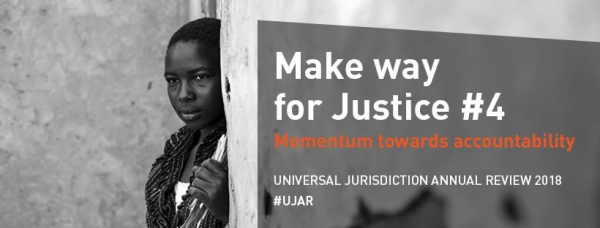“Rarely has the fight against impunity been so dynamic” says Geneva-based group TRIAL International. “In 2017, countries in Africa, Europe, North America and Latin America tightened the net on war criminals by resorting to universal jurisdiction.” This is a legal principle under which countries can prosecute foreign war criminals when they visit or live on their territory.
“Last year, war crimes units (WCUs) around the world tightened the net on war criminals,” says the annual report of TRIAL International, which helps victims of mass crimes obtain justice. “While European countries continue to be the main drivers of universal jurisdiction cases, complaints have been filed all around the world against war crime suspects. Colombia, Brazil, Argentina and Gambia joined the team, making the fight against impunity more and more universal.”
So countries in Africa and Latin America are also starting to use universal jurisdiction, including to fight cases of impunity that persist in Western Europe. One example is Spain, which has an amnesty law covering the 40-year dictatorship of General Franco, adopted in 1977 after the dictator died. Given this “law of silence”, Spanish victims found a judge in Argentina willing to hear them and launch legal proceedings against their former torturers. This is the poignant story told in a new documentary called “The Silence of Others”, shown at Geneva’s International Film Festival and Forum on Human Rights in the context of a debate co-organized last week by TRIAL International.
"This film shows that universal jurisdiction is not just something used by the countries of the North to address impunity in the South," says TRIAL International director Philip Grant. "Spain is a perfect example of a developed country where there is total impunity notably for the mass crimes of the Franco era. And the victims are trying to get justice in Argentina. In the past, the criminals of the Argentine dictatorship were tried in Spain, but now it is the other way round, which is a great example of the current globalization of international justice."
Universal Jurisdiction in the Eyes of an Expert
Interview with Philip Grant, Director of TRIAL International. The interview was conducted for JusticeInfo.net by Eden Matiyas at the International Film Festival and Forum on Human Rights in Geneva.
JusticeInfo: When did universal jurisdiction begin?
Philip Grant: The first illustration of universal jurisdiction was in 1961 when former Nazi officer Eichmann was arrested in Argentina by Israeli intelligence agents and brought to trial in Israel. Israel put him on trial for crimes that were committed against the Jewish people before Israel even existed as a state. The idea behind this principle is that he represented all the victims, not just the Israeli victims. After the Eichmann trial, there was a long pause until the Pinochet case in 1998. Although there was no trial, the case represents one of the most important advances in the recent history of universal jurisdiction. It was also a huge symbol of what victims could achieve by using this legal mechanism. This precedent put universal jurisdiction on the map.
Is universal jurisdiction accepted, and what are the challenges?
The principle of universal jurisdiction is accepted. It comes from international law such as the Geneva conventions, which are ratified by almost all of the states. Most of the conventions to some extent have universal jurisdiction in their laws. However, the problem is the application. One of the challenges is that there is a need to have specialized staff that can handle very complex situations. The crimes can be investigated for years, the crime scene is sometimes thousands of kilometres away, access is difficult and there are issues such as how to put in place effective protection measure for victims and witnesses. But these cases in lots of contexts are do-able and there are increasing numbers of convictions. We now see a lot of cases being examined in Switzerland that are stemming from the Gambia, Algeria and other countries. This shows us it is not localized in one or two contexts but getting much broader.
What is the role of NGOs in this regard and what partnership does TRIAL International have with other NGOs working on universal jurisdiction?
The role of NGOs is fundamental. NGOs have the capacity that authorities don’t have to work outside the borders of the country without needing to ask the cooperation of the country in which we are investigating. It should be noted that NGOs are not there to replace or perform the job of the prosecutor but to investigate and bring the information to the authorities and enable them to do their work. Also, NGOs are more flexible than any police force. For instance, if we need to go to the Gambia tomorrow, we book a plane, request a visa and we are there. We can meet victims, insiders, and witnesses. We then present our findings, giving the testimony of witnesses and victims, which saves the authorities time.
There are not a lot of organizations that have the mandate, capacity, and expertise on the ground to investigate, so the movement needs to be networked and shaped. We are now seeing victims’ groups join the fight alongside lawyers, human rights advocates and investigators. For instance, Hissène Habré, the former dictator of Chad was sentenced in Senegal thanks in large part to powerful NGOs pairing up with victims’ groups and local organizations. This is now being reproduced in the Gambia, the campaign to bring former president Yahya Jammeh to justice. Trial International is part of a coalition and we are gathering momentum and trying to see what legal avenue could be made available.
Why it is that universal jurisdiction does not apply in many cases such as Syria or Myanmar?
It is not a lot, but there are Syrian cases that have gone to court and there are people in Sweden who have been sentenced to prison terms based on universal jurisdiction. Universal jurisdiction is the last resort, and in certain contexts its application is difficult. For instance, in Myanmar, the language barrier, the fact that most victims end up in Bangladesh and the lack of capacity to undertake interviews makes it challenging but not completely impossible. Moreover, there is a need to monitor perpetrators to see if they travel to a country where a complaint can be lodged against them. There are other situations which might be easier, mostly after a regime change. It is much more complicated to prosecute people who are still there and benefiting from the support of people in power. Nonetheless there are groups on the ground already starting to collect evidence that could serve for future cases.
Becoming more global
As the report says, many countries have set up war crimes units. In 2017, these specialized units investigated, prosecuted or brought to trial 126 suspects of the most serious crimes.
This may seem surprising at a time when even the champions of democracy and human rights are ceding ground to “Realpolitik” and economic interests, but Philip Grant has an explanation. “This trend is linked particularly to the war in Syria,” he says, “because of the exodus of hundreds of thousands of Syrians, both victims and suspected perpetrators, who are now in European countries. And some war crimes units are determined to act against the perpetrators of atrocities in Syria.”
This comes even as the UN Security Council continues to block referring Syria to the International Criminal Court (ICC), despite repeated calls from many European countries and the independent commission of inquiry on Syria mandated by the Human Rights Council at the beginning of a war that rapidly turned in favour of the Assad regime.
The rise of such investigations and trials shows that some of the victims of atrocities in Syria and elsewhere have not given up hope of being heard by courts of justice, despite the pain and difficulty that may bring them.
Providing resources
In its report, TRIAL International stresses how the many difficulties on the road to international justice can be overcome. “States who commit sufficient means to specialized units are leading the fight against impunity today by turning the word justice into action,” says report author Valerie Paulet in a statement accompanying the report.
Philip Grant stresses that these cases are complex, and so if a state does not give itself the necessary resources things will stall. What is needed, he says, is also good collaboration within the state apparatus, immigration services that can filter out people suspected of war crimes and capable of hearing victims. He says it is not unusual that victims and perpetrators turn up in the same asylum seekers’ centre. Specialized prosecutors and international cooperation are also needed. Here there is still much work to be done, says Grant, even if the war crimes units from different countries meet twice a year in The Hague to exchange information and experiences.
Switzerland lagging
The judicial means are lacking notably in two European countries – the UK and Switzerland --, according to the TRIAL International report. The UK has merged the mandate of its war crimes unit with the fight against terrorism, whilst the Swiss unit is limited by the fact that its resources are shared with work on mutual judicial assistance.
Philip Grant says Switzerland’s efforts look good on paper but are lacking in practice. “Switzerland has good laws, but has not given itself the means to apply them,” he says. “For the Justice Ministry, it is not a priority.”






